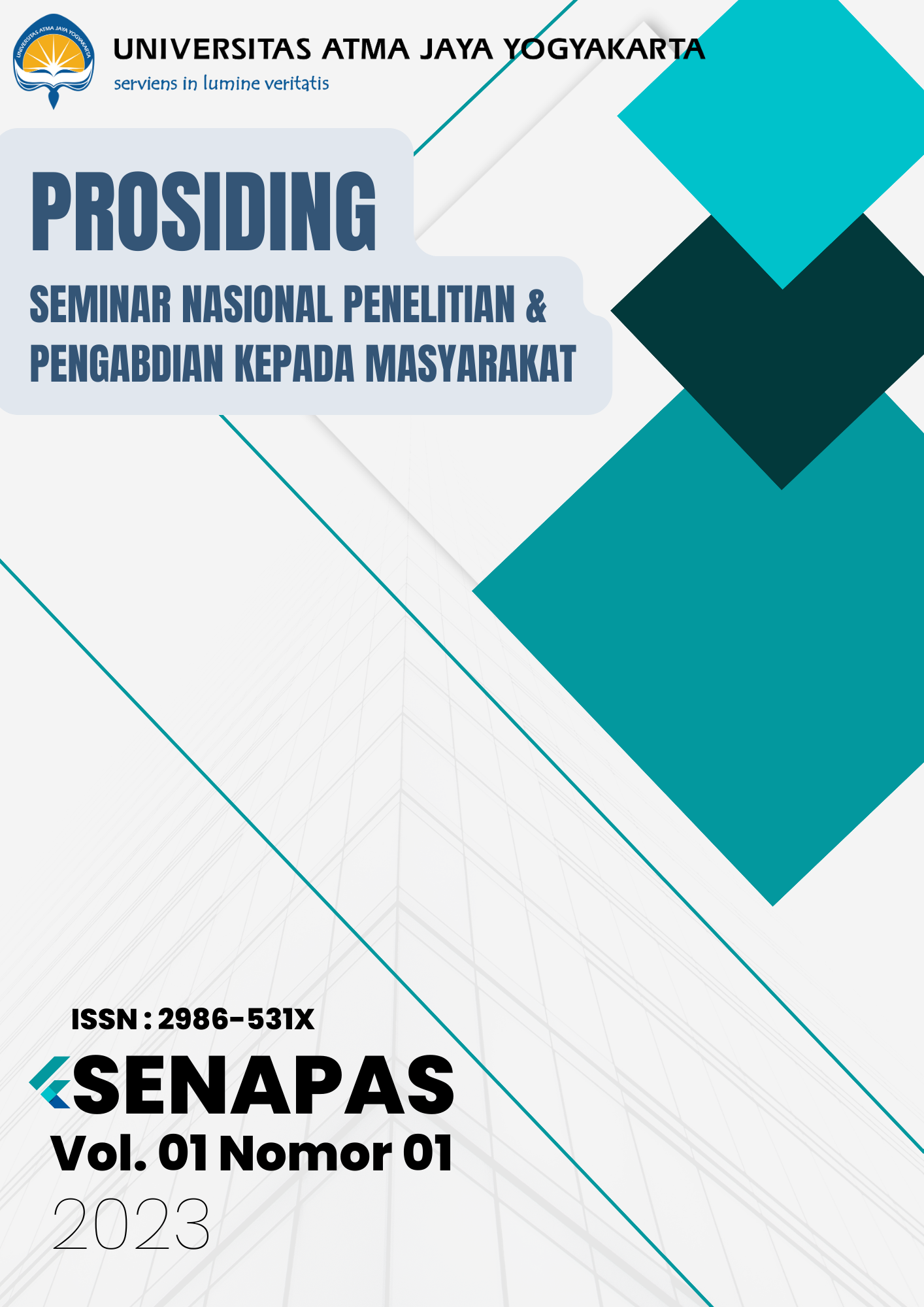Appreciative Inquiry: Metode Engagement dan Komunikasi Pemberdayaan Masyarakat
DOI:
https://doi.org/10.24002/senapas.v1i1.7377Keywords:
appreciative inquiry, engagement, development, empowermentAbstract
Artikel ini bertujuan untuk mendiskusikan appreciative inquiry sebagai metode engagement yang memberdayakan dalam pembangunan. Engagement merupakan proses pelibatan komunitas sebagai subjek pembangunan melalui proses interaktif dan dinamis untuk menciptakan makna bersama. Studi kasus pada proses engagement dalam pembangunan pembangkit listrik tenaga mikro hidro di Kulon Progo dipilih untuk memahami fenomena penelitian ini. Focus Group Discussion terhadap tiga kelompok komunitas dilakukan untuk mengumpulkan data. Hasil penelitian ini menunjukkan bahwa appreciative inquiry memberikan alternatif engagement yang memberdayakan dikarenakan (1) menempatkan anggota masyarakat sebagai aktor pembangunan, (2) berfokus pada aspek positif dalam masyarakat, (3) bersifat percakapan dan berbagi cerita, (4) merupakan model inklusif untuk memastikan keterlibatan masyarakat, dan (5) mengakomodasi nilai lokal. Terlepas dari kelebihan tesebut, artikel ini juga mengidentifikasi adanya tantangan dalam menjalankan appreciative inquiry sebagai metode engagement, yaitu aspek kepercayaan di antara pihak terkait, nilai tradisional yang konserfatif, dominasi pemimpin dan kekhawatiran dianggap berbeda dari kelompok.References
J. Srampickal, "Development and Participatory Communication," Communication Research Trends, vol. 25, no. 2, 2006.
R. Lie and J. Servaes, "Disciplines in the field of communication for development and social change," Communication Theory, vol. 25, no. 2, pp. 244-258, 2015, doi: 10.1111/comt.12065.
P. Mefalopulos, Development Communication Sourcebook, Broadening the Boundaries of Communication. Washington, DC: The World Bank, 2008.
K. A. Johnston, "Toward a theory of social engagement," in The handbook of communication engagement, K. A. Johnston and M. Taylor Eds., 1st Edition. ed. Hoboken: Wiley-Blackwell, 2018, pp. 19-32.
A. Delgado, K. L. Kjolber, and F. Wickson, "Public engagement coming of age: From theory to practice in STS encounters with nanotechnology," Public Understanding of Science, vol. 20, no. 6, pp. 826–845, 2011, doi: https://doi.org/10.1177/0963662510363054.
G. A. Yudarwati, "Appreciative inquiry for community engagement in Indonesia rural communities," Public Relations Review, vol. 45, no. 4, p. 101833, 2019/11/01/ 2019, doi: https://doi.org/10.1016/j.pubrev.2019.101833.
B. L. Devin and A. B. Lane, "Communicating Engagement in Corporate Social Responsibility: A Meta-Level Construal of Engagement," Journal of Public Relations Research, Article vol. 26, no. 5, pp. 436-454, 2014, doi: 10.1080/1062726X.2014.956104.
M. C. Porter, B. Anderson, and M. Nhotsavang, "Anti-social media: executive Twitter “engagement” and attitudes about media credibility," Journal of Communication Management, Article vol. 19, no. 3, pp. 270-287, 2015, doi: 10.1108/JCOM-07-2014-0041.
J. Chilvers, "Deliberating Competence: Theoretical and Practitioner Perspectives on Effective Participatory Appraisal Practice," Science, Technology & Human Values, Article vol. 33, no. 2, pp. 155-185, 2008, doi: 10.1177/0162243907307594.
S. McCormick, "Democratizing Science Movements: A New Framework for Mobilization and Contestation," Social Studies of Science (Sage Publications, Ltd.), Article vol. 37, no. 4, pp. 609-623, 2007, doi: 10.1177/0306312707076598.
D. L. Cooperrider, D. K. Whitney, and J. M. Stavros, Appreciative inquiry handbook : for leaders of change, 2nd ed. San Francisco, CA: Crown Custom Publishing, 2008, pp. xxx, 454 p.
G. R. Bushe, "Appreciative inquiry," in Encyclopedia of Management Theory, vol. 1, E. H. Kessler Ed. California: Sage, 2013, pp. 1-5.
R. K. Yin, Case study research and applications : design and methods, Sixth edition. ed. Los Angeles: SAGE, 2018, pp. xxx, 319 pages.
W. L. Neuman, Basics of social research : qualitative and quantitative approaches, 7 ed. London: Pearson Education Limited, 2014.
M. B. Miles, A. M. Huberman, and J. Saldaña, Qualitative Data Analysis : an Expanded Sourcebook, 3rd ed. Thousand Oaks, CA: Sage Publications, 2014, pp. xiv, 338 p.
D. L. Cooperrider, D. L. Cooperrider, J. M. Stavros, D. K. Whitney, and Alexander Street Press., Appreciative inquiry handbook : for leaders of change, 2nd ed. San Francisco, CA ; Berrett-Koehler Publishers
T. Lane and J. Hicks, "Best Practice Community Engagement in Wind Development." [Online]. Available: http://cpagency.org.au/wp-content/uploads/2014/03/Attachment-E-Best-practice-community-engagement-in-wind-development-FINAL-V1.0.pdf.
F. Jackson et al., "Save 100 Babies©: Engaging Communities for Just and Equitable Birth Outcomes Through Photovoice and Appreciative Inquiry," Maternal & Child Health Journal, Article vol. 18, no. 8, pp. 1786-1794, 2014, doi: 10.1007/s10995-014-1436-9.
T. Tufte and P. Mefalopulos, "Participatory communication: A practical guide," World Bank, 2009.
N. Narayanasamy, Participatory rural appraisal : principles, methods and application. Thousand Oaks: SAGE Publications, 2009, pp. xx, 363 p.
S. R. Melkote, "Communication for development and social change: an introduction," Journal of Multicultural Discourses, vol. 13, no. 2, pp. 77-86, 2018/04/03 2018, doi: 10.1080/17447143.2018.1491585.
X. Ú. Martínez, M. Jiménez-Morales, P. S. Masó, and J. T. Bernet, "Exploring the conceptualization and research of empowerment in the field of youth," International Journal of Adolescence and Youth, vol. 22, no. 4, pp. 405-418, 2017/10/02 2017, doi: 10.1080/02673843.2016.1209120.
S. R. Melkote and H. L. Steeves, Communication for Development in the Third World: Theory and Practice for Empowerment. New Delhi: Sage Publications India Pvt Ltd, 2001.
D. Narayan, "Empowerment and Poverty Reduction : A Sourcebook," World Bank., 2002.
D. Cooperrider and L. E. Sekerka, " Toward a theory of positive organizational change. ," in Organization Development: A Jossey-Bass Reader, J. V. Gallos Ed. San Francisco: Jossey-B, 2006, pp. 223-238.
J. D. Ludema, T. J. Griffin, B. J. Mohr, D. K. Whitney, and Alexander Street Press., The appreciative inquiry summit : a practitioner's guide for leading large-group change, San Francisco, CA: Berrett-Koehler Publishers,, 2003, pp. 1 online resource (xx, 310 pages). [Online]. Available: http://ezproxy.lib.monash.edu.au/login?url=http://www.aspresolver.com/aspresolver.asp?BIZP;2359857.
V. Gupta and Devalina, "Role of Positive Emotions in Organisational Coping," (in English), Journal of Organisation and Human Behaviour, vol. 4, no. 2, 2015
M. G. Wing, K. Edwardsen, M. B. McNair, E. Miles, K. Wilson, and J. Sessions, "Developing a sustainable water-delivery system in rural El Salvador," Sustainability: Science, Practice and Policy, vol. 3, no. 1, pp. 72-78, 2007, doi: 10.1080/15487733.2007.11907994.
G. A. Yudarwati and A. Gregory, "Improving government communication and empowering rural communities: Combining public relations and development communication approaches," Public Relations Review, vol. 48, no. 3, p. 102200, 2022/09/01/ 2022, doi: https://doi.org/10.1016/j.pubrev.2022.102200.
G. D. Parahita, "Shifts and Challenges of Communication for Sustainable Development in Indonesia," in Communication, Culture and Ecology, Rethinking Sustainable Development in Asia, K. Prasad Ed. Singapore: Springer, 2018, ch. 11, pp. 155-172.
J. Sass, "Deliberative Ideals Across Diverse Cultures," in The Oxford Handbook of Deliberative Democracy, A. Bächtiger, J. S. Dryzek, J. Mansbridge, and M. Warren Eds. Oxford: Oxford University Press, 2018, pp. 86-99.
C. Chwalisz. "A New Wave of Deliberative Democracy." Carnegie Europe. https://carnegieeurope.eu/2019/11/26/new-wave-of-deliberative-democracy-pub-80422 (accessed.
E. Blacksher, "Participatory and Deliberative Practices in Health: Meanings, Distinctions, and Implications for Health Equity," Journal of Deliberative Democracy, vol. 9, p. 6, 04/30 2013, doi: 10.16997/jdd.158.
Å. Thelander and F. Säwe, "The challenge of internal stakeholder support for co-creational branding strategy," Public Relations Inquiry, vol. 4, no. 3, pp. 323-341, 2015/09/01 2015, doi: 10.1177/2046147X15573882.
OECD, Innovative Citizen Participation and New Democratic Institutions: Catching the Deliberative Wave. Paris: OECD Publishing, 2020.
Downloads
Published
Issue
Section
License
Copyright (c) 2023 Gregoria Yudarwati

This work is licensed under a Creative Commons Attribution-ShareAlike 4.0 International License.









